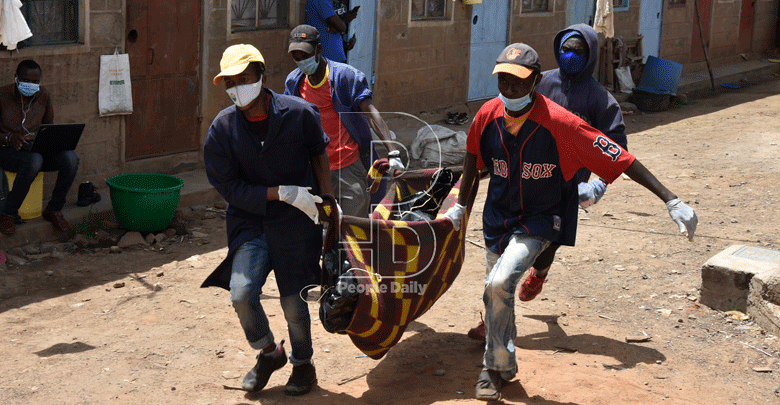KIAGE: Concern as homes turn into horror killing fields

Nyaboga Kiage
Yesterday’s discovery of a decomposing body of a woman in Kambi Moto village in Ruiru, Kiambu County is the most recent death linked to a wave of domestic violence that has hit the country.
The woman had been sharing the house with her boyfriend as recently as Monday when neighbours last saw him.
The police suspect she might have been killed one week ago, judging from the state of the body.
Neighbours told the police that the woman’s lover, the main suspect in the murder, has been in and out of the house but did not return home on Monday evening.
It is the latest reported murder by a suspected spouse or lover that has established a worrying trend.
In what could be best described as a high-octane resurgence of Gender Based Violence (GBV), yesterday’s incident brings the number of such deaths since January to 11.
On April 19, Albert Maeche went into hiding after allegedly killing his wife in Kamulu, Machakos County.
Neighbours told the police that Maeche had called the building’s caretaker and asked him to check on his wife who, he said, was unwell and was not responding to phone calls.
Juja killing
It is then that the caretaker went to the house, found the door open and walked in only to find the lifeless body of a woman on the bed and blood oozing from her armpits.
On the same day, Bonface Murithi, 25, in Meru County is alleged to have killed his daughter by hacking her with a machete while her mother watched.
Still on the same day, a woman in Kiboko village, Kiambu County, killed her boyfriend after stabbing him in the chest and head over alleged infidelity.
On April 16, Christine Nyokabi was murdered by her lover identified as Evans Karani in Juja, Kiambu County.
On Monday, Karani shocked a Kiambu court when he told the judge to make a quick ruling on the matter. He is being held at Juja police station. The cases go on and on.
Yesterday, Opposition leader Raila Odinga called for talks on gender violence. In a statement,he regretted deaths resulting from domestic differences.
“Too many lives are being lost on an almost a daily basis going by media reports,” he said.
Raila said murders cannot become the new normal and asked couples that cannot solve their differences to part ways.
“It is unfortunate that after winning their partner’s heart, instead of going on to cherish and love them, some suddenly turn physical, and at times horrifically end up killing them. This scourge must come to an end,”he said.
Kitui Governor Charity Ngilu condemned the recent killings of women and asked the Judiciary to promptly resolve the murders.
“These women are in the prime of their life, with young children to look after. This is a national crisis which must be addressed by all leaders. We must have a national conversation on this crisis,” Ngilu said.
Uhuru’s order
She said most of the suspects were still walking free and it was a danger to other women. The governor said women must feel secure in their homes and everywhere else.
In July last year, President Uhuru Kenyatta ordered an investigation into rising reports of violence against women and girls, which included rape, domestic violence, female genital mutilation (FGM) and child marriages due to Covid-19 restrictions.
The President directed the National Crime Research Centre to come up with an advisory to security agencies on remedial action and kick off prosecution of violators.
Despite the Head of State’s order, domestic violence has been on an upward trajectory.
Experts and reports attribute the rise in domestic violence to life getting difficult.
In a report released on Sunday by Infotrak Research, Kenyans are worried about living costs and experts believe this drives many to distress.
The report said most Kenyans lost their jobs due to the pandemic and are also distressed by the 8pm to 4am curfew.
The National Council on Administration of Justice also said that there is a significant spike in sexual offences, noting that most of the perpetrators are relatives, guardians or people living with the victims.
According to government data, 45 per cent of women and girls aged between 15-49 have experienced physical violence and 14 per cent have experienced sexual violence. Many of the cases go unreported.
And when they get reported, families usually seek out-of-court settlement.
According to the World Health Organisation (WHO), violence against women usually increases during emergencies which include epidemics, disruption of social and protective networks, economic hardship and decreased access to services.
“In the case of Covid-19, isolation, restricted movement and stay-at-home measures to contain the spread of the infection have a particular acute impact on women.
The chances of women and their children being exposed to violence is dramatically increased, as family members spend more time in close contact and household stress intensifies, and the risk grows even greater when families also have to cope with job losses,” WHO said.
The organisation said services such as clinical management of rape, first-line support and basic mental health services for survivors are overwhelmed by the urgent need to counteract the effect of the pandemic.
It warned that this can lead to dramatic outcomes in countries that have limited health services.
A national helpline, supported by the department of gender affairs, has reported an increase in the number of calls received every month.
Fanis Lisiagali, the helpline’s director, recently told the media that the calls come from all parts of the country.
“We get all kinds of cases – some are psychological torture, others are physical assault, rape and defilement.
We also have cases of child marriage and female genital mutilation being reported, but these are few as much of it is hidden,” she said.
The United Nations has raised the alarm on the drastic increase in domestic abuse and described it as a “shadow pandemic.”
Christopher Kigen, a psychiatrist attached to Mbagathi Hospital, told People Daily that a number of factors lead to gender violence.
According to him, drug abuse, frustrations, impunity, poverty, lack of education and family issues contribute to the increase of domestic violence and are categorised into three groups: Sexual violence, physical violence and mental violence.
According to him, the current pandemic is a contributor to the increase in domestic violence.
“This pandemic can in future cause post traumatic disorders and some communities and families can be stigmatised,” Kigen, who also works with Nairobi Women’s Hospital said.
Asked about signs that a relationship is headed south, Kigen said they include verbal abuse, bad temper, violence, neglecting home responsibilities, cruelty, lack of control of finances and sexual harassment.
Kigen says the country and health facilities should embark on developing support programmess to families, creating awareness and providing clinical and psychological services to the people.
A report by the International Development law Organization (IDLO) states that the pandemic exacerbates threats to women’s access to justice institutions, rising intimate partner violence, growing injustice for women workers and discriminatory laws, combined with pre-existing gender inequalities.
“The report identifies the common justice problems women face, makes the case for investment and recommends strategies to accelerate action around justice for women,” it reads in part.
@NyabogaKiage








